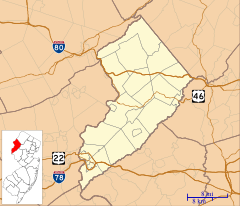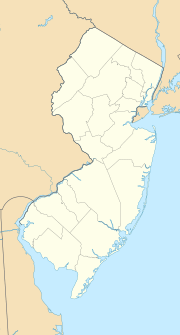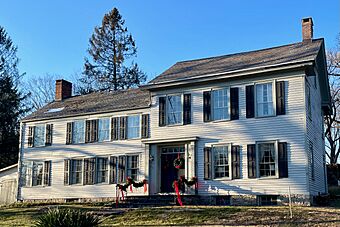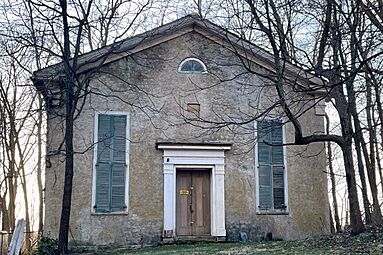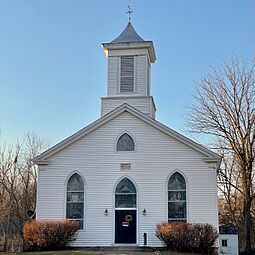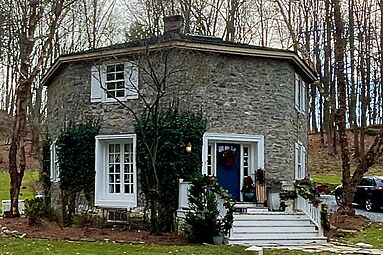Johnsonburg, New Jersey facts for kids
Quick facts for kids
Johnsonburg, New Jersey
|
|
|---|---|
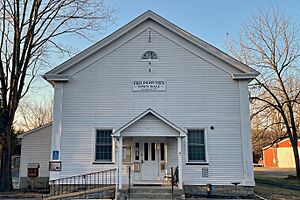
Frelinghuysen Township Hall
|
|
| Country | |
| State | |
| County | Warren |
| Township | Frelinghuysen |
| Area | |
| • Total | 1.07 sq mi (2.76 km2) |
| • Land | 1.06 sq mi (2.76 km2) |
| • Water | 0.00 sq mi (0.00 km2) 0.00% |
| Elevation | 574 ft (175 m) |
| Population
(2020)
|
|
| • Total | 381 |
| • Density | 357.75/sq mi (138.12/km2) |
| Time zone | UTC−05:00 (Eastern (EST)) |
| • Summer (DST) | UTC−04:00 (EDT) |
| ZIP Code |
07846 - Johnsonburg
|
| Area code(s) | 908 |
| FIPS code | 34-36150 |
| GNIS feature ID | 02584004 |
Johnsonburg is a small community in New Jersey. It is located in Frelinghuysen Township, which is part of Warren County. Johnsonburg is also known as a census-designated place (CDP). This means it's an area identified by the U.S. Census Bureau for statistical purposes. In 2020, about 381 people lived here. This was a big jump from the 101 people counted in 2010!
Contents
History of Johnsonburg
Johnsonburg started as an important stop for stagecoaches. Stagecoaches were like old-time buses that carried people and mail. Two main routes crossed here. One went from Dover, New Jersey, to Stroudsburg, Pennsylvania. The other went from Albany, New York, to Philadelphia, Pennsylvania. Because these routes met, a post office and a tavern were built. The tavern became a popular meeting spot. People even held elections and important meetings there.
In 1753, a jail was built. The community then became known as "Log Gaol," which means "log jail." From 1753 to 1765, Log Gaol was the county seat for Sussex County. This meant it was the main town where the county government and court were located.
By 1882, Johnsonburg had grown to about 300 people. It had its own post office and a large factory that made gloves. The town was also a good place for local businesses.
Later, in 1911, the Delaware, Lackawanna and Western Railroad opened a train station in Johnsonburg. This railway line connected Hoboken, New Jersey, to Buffalo, New York. It was very important for local dairy farmers. They used the train to send their milk and other dairy products to big cities like Newark and New York City. Sadly, the old train station is no longer there.
Geography of Johnsonburg
Johnsonburg is a small area of land. According to the U.S. Census Bureau, the community covers about 0.196 square miles (0.509 square kilometers). It does not have any water areas within its boundaries.
Population Changes
The number of people living in Johnsonburg has changed over the years.
| Historical population | |||
|---|---|---|---|
| Census | Pop. | %± | |
| 2000 | 59 | — | |
| 2010 | 101 | 71.2% | |
| 2020 | 381 | 277.2% | |
| U.S. Decennial Census 2010 2020 |
|||
In 2010, there were 101 people living in Johnsonburg. There were 42 households, and 32 of them were families. The average household had about 2.4 people. The average family had about 2.75 people.
Most of the people living in Johnsonburg in 2010 were White. No one identified as Black, Native American, or Asian. There were also no people of Hispanic or Latino background.
About 16.8% of the population was under 18 years old. About 15.8% of the population was 65 years or older. The average age of people in Johnsonburg was 46.4 years.
Johnsonburg Historic District
Johnsonburg has a special area called the Johnsonburg Historic District. This is a 163-acre area that has been recognized for its important history and architecture. It was added to the National Register of Historic Places in 1992. This means the buildings and sites in this area are protected because they show how the community grew and developed.
The district includes 74 buildings, 4 sites, 3 structures, and 1 object that help tell the story of Johnsonburg. Many of these buildings show different styles of architecture. For example, the Armstrong/Blair House has both Colonial Revival and Greek Revival styles.
The Frelinghuysen Township Hall used to be a church called the Presbyterian Chapel. It was built in 1851 and shows Greek Revival and Federal styles. The Christian Church is a stone church built around 1838 to 1848. The Methodist Episcopal Church, built in 1850, features Gothic Revival architecture.
One interesting building is the John Gibbs House. It was built in 1853 and is an example of an octagon house. This means it has eight sides!
See also
 In Spanish: Johnsonburg (Nueva Jersey) para niños
In Spanish: Johnsonburg (Nueva Jersey) para niños


